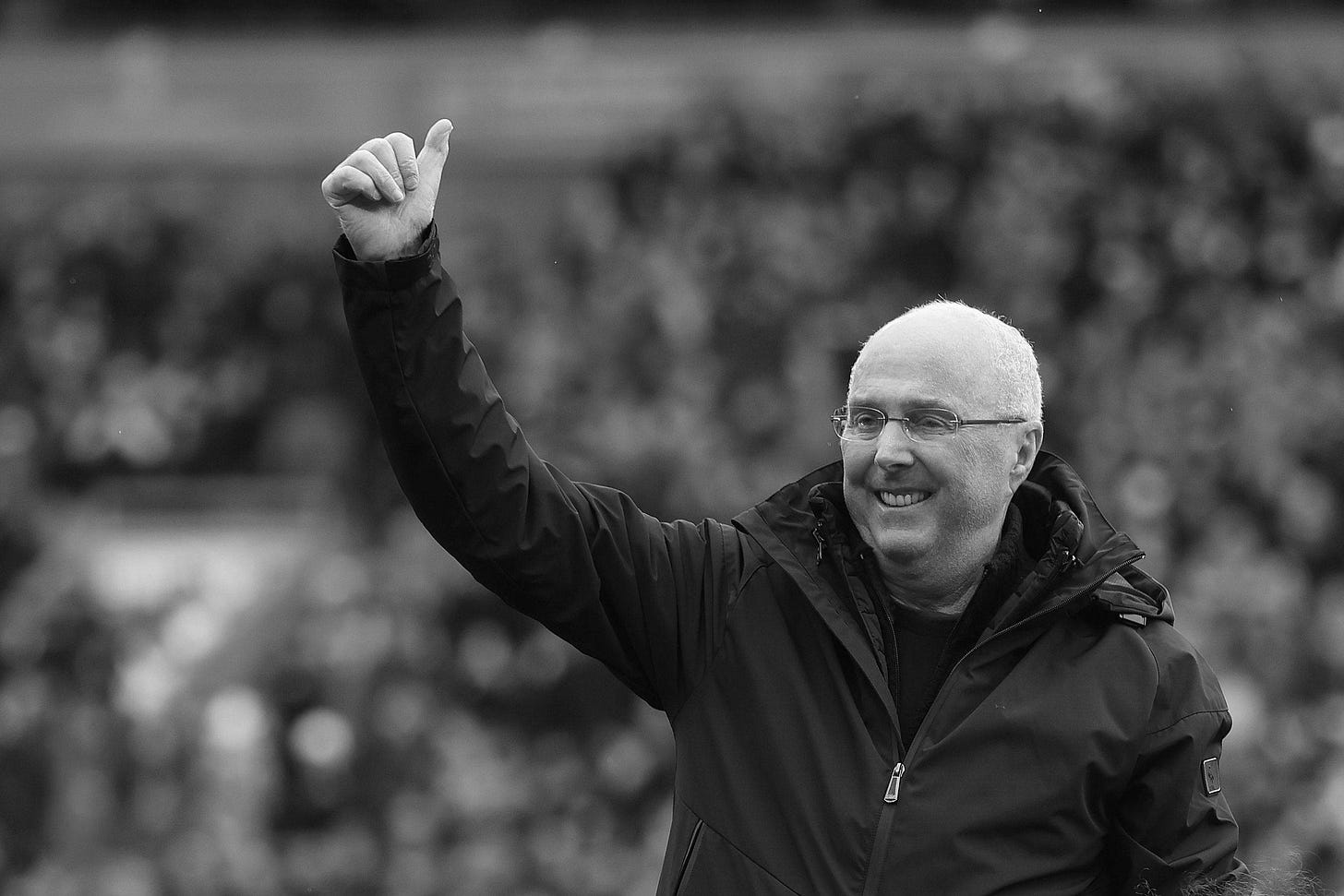Sven-Gören Eriksson is England's most popular Swede
Sven-Göran Eriksson was the first foreign national team coach in England's history - and above all one who enjoyed life and allowed his players to do the same.

Sven-Göran Eriksson's retirement from soccer seemed to be in keeping with his eventful life. When the Swede announced at the beginning of the year that he was suffering from incurable pancreatic cancer and only had a year to live, he stated that it had always been his heart's desire to coach Liverpool FC at some point in his career. His father has been a lifelong supporter of the club and follows every game. At the invitation of then coach Jürgen Klopp, Liverpool actually offered Eriksson the chance to coach a legends' team at a charity match at Anfield Road.
Eriksson accepted and led both teams into the stadium in tears; the fans also sang the anthem “You'll never walk alone” for him. He later summed up his emotional LFC day as a “memory for life”. The visit demonstrated the popularity he had gained during his almost six-decade-long soccer career. It was also an expression of his undaunted zest for life and fulfillment in his profession.
After an unremarkable playing career in the lower leagues in his home country, Sven-Göran Eriksson, who was born in Torsby on the picturesque Lake Fryke in 1948 and grew up in modest circumstances, started in management at an early age. He led the third division club Degerfors IF straight to promotion and went on to win the Swedish Cup with IFK Göteborg. He attracted international attention with the same club when they sensationally won the 1982 UEFA Cup, beating the German clubs 1. FC Kaiserslautern and Hamburger SV in the semi-final and final. Eriksson's approach was characterized by the Anglo-Saxon principles cultivated in Sweden at the time by the English coaches Roy Hodgson and Bob Houghton. Like both, he relied on a pragmatic style of play with a compact defense and established a team climate in which the players felt at ease.
His greatest match as England coach: the 5:1 against Germany in Munich
His profile aroused desires abroad. He was first drawn to Benfica Lisbon, then to Italy, where he experienced his most successful phase: AS Rome, Sampdoria Genoa, Lazio Rome, winning the Cup with each club, the European Cup Winners' Cup with Lazio in 1999 and the championship in 2000. His successes earned him an offer from the English Football Association to become the first foreign national coach in history. At the beginning of his tenure, Eriksson's England achieved an unparalleled triumph against Germany in Munich's Olympic Stadium: 5:1 - the English qualified for the 2002 World Cup, while the Germans ultimately had to go through to the play-offs.
But the following years did not live up to expectations. England's so-called golden generation around the world stars David Beckham, Paul Scholes and Gary Neville failed to reach the quarter-finals at all three tournaments under Eriksson's leadership. Unlike most of his coaching colleagues, Sven-Göran Eriksson did not just doggedly pursue success, but also enjoyed his life, always kind-hearted and modest, but sometimes also naïve. As England coach, he had two affairs, including one with the association secretary. The tabloid press mocked him as “horny Sven”.
Sven-Göran Eriksson never held a grudge - not even against the tabloids that mocked him
Before the 2006 World Cup, he fell for a trick: Sven-Göran Eriksson declared his willingness to coach an English club in the new season to a tabloid reporter disguised as a sheikh who expressed a fictitious interest in buying the club. This meant that he could no longer be retained as national team coach and shortly afterwards he announced his retirement for after the tournament. Looking back, Eriksson admitted that he believed he had been prepared for the job in England - but that was not the case with his private life.
Nevertheless, Eriksson held no grudges. The Daily Mail, which never shied away from a headline about him, now writes approvingly that the coach “never paid back his critics in kind”. The same applied to his treatment of the players, he protected them in every situation. In his last official act as England coach, he implored that Wayne Rooney, who was partly responsible for the team's exit from the tournament after being sent off, be treated leniently.
What is there to celebrate? - “Life, Emperor,” says Sven-Göran Eriksson
From then on, his reputation was ruined and his methods seemed increasingly antiquated. Eriksson only caused a stir once more when he almost became coach of the chaotic 1860 Munich club in January 2013. As the preferred personnel of investor Hasan Ismaik, he was to be involved in the club's sporting affairs and even sat in the stands at one of the club's second division home games. His installation dragged on for months in the disunited management until the supervisory board - unforgettably in the middle of the night after an hour-long meeting - gave the green light. In the end, however, things were too hot for Eriksson and he rejected the project.
In total, the Swede coached more than a dozen clubs and four national teams, and was also present in the Ivory Coast and the Philippines. His half a world tour reflected his attitude to life. In his autobiography, Dietmar Hamann recounts how he saw Eriksson one morning at Manchester City by the pool with a bottle of champagne. He asked him what he was celebrating. Eriksson turned around and said with a smile: “Life, Kaiser!” Despite his serious illness, Eriksson retained his vitality right to the end, visiting some of his former clubs again in recent months. In the life documentary “Sven” on Amazon Prime, he recently said in the end credits that you should treat your own life with care and, above all, live it. Sven-Göran Eriksson died on Monday at the age of 76.

